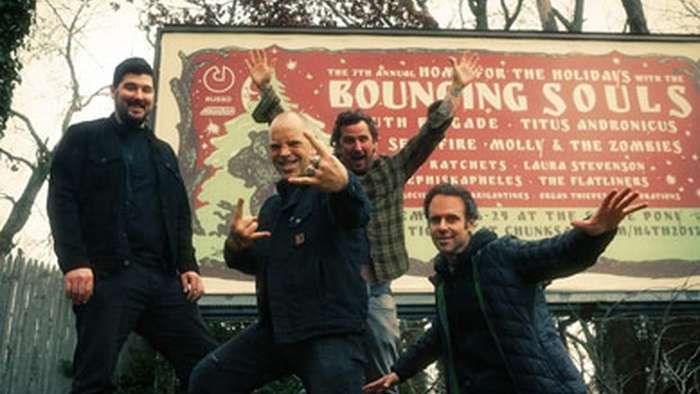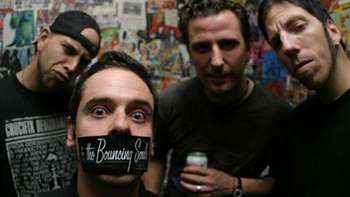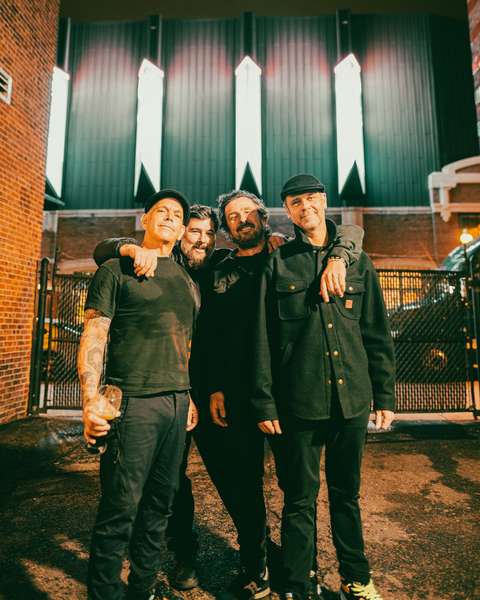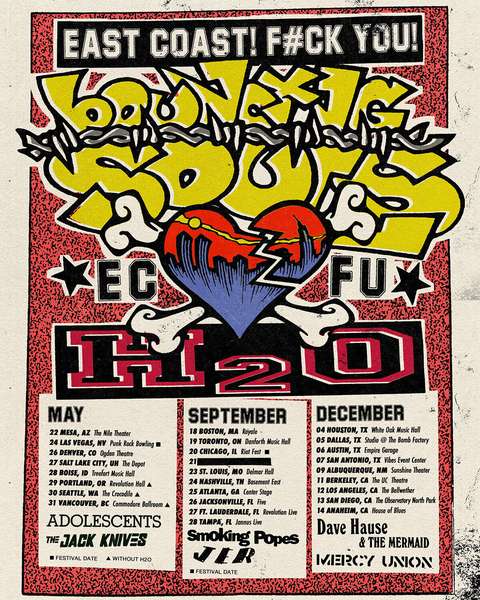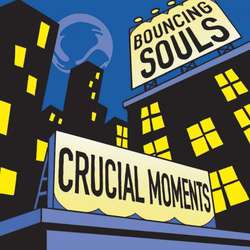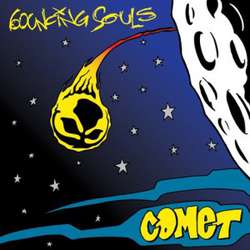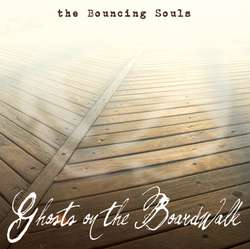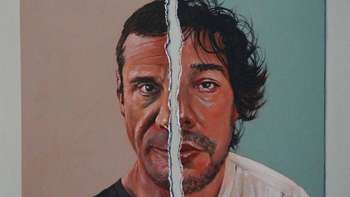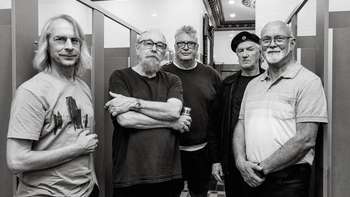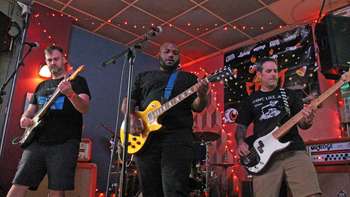The Bouncing Souls have been a band now for longer than I've been alive, and let's just say I'm not a teenager anymore. The incredible thing about these Jersey punks is that they've managed to remain on my record player long after my teenage years—which, let's face it, most of the bands you listened to at 13 have long been forgotten about. In an era where punk music is labeled either juvenile or nostalgic, the Bouncing Souls are proving that punk music is here to stay and it's never been better. I was fortunate enough to sit down with singer Greg Attonito during the Souls latest tour and pick his brain on everything from his thoughts on music today to the unending success of the band.
Scene Point Blank: I grew up in New Jersey and I have a love/hate relationship with that state. I know you grew up there too and was wondering if you had similar or differing thoughts about Jersey?
Greg Attonito: I'm really glad that I was brought up there. I feel really fortunate just geographically because we lived in a small town and we had some green and trees—we lived in a mellow town where we could go be free as kids, which now you can't. So just that, I feel really happy about. But I had close proximity to NYC and I had family there, so I would go visit there to see shows and it was culturally awesome. There's a lot going on, even now. I don't live there anymore and I'm happy I don't. I still appreciate going there and visiting my family and friends, and I feel at home there still. It's crowded and it's an intense place to live. I don't need that intensity anymore, but I did when I was 20 years old and lived in New Brunswick. It will always have a place in my heart in the details and little things; it's in my DNA.
Scene Point Blank: As a teenager who grew up listening to the Bouncing Souls, I think it's really cool you guys have managed to keep making music and touring for so long. A lot of bands go through member changes or their style of music completely changes etc., but for the most part you still appear to be the same band people love. Do you ever reflect back on your time as a band and just think "How the hell did we make it this far" because you've accomplished a lot many punk bands haven't?
Greg Attonito: I honestly believe it's sorta a small miracle that we're still doing it and that we still like each other and enjoy it. I think it's so many factors that have gone into it; some are choices we've made and most of it is just fortunate things whether it was people in our lives or circumstances that allowed and helped us to keep going. So many factors that it's a long, long story. But in general, to really summarize, in essence we love each other and there's something special that we bring to the world and to ourselves. We're powering ourselves by being creative and we have a certain chemistry that we like what we're doing and the fact that we can bring that out in the world and people respond to it in a really positive way, I think that's driven us and been a motivating factor. And then you find a way over the hurdles. We've had people who've helped us along because they've been inspired by what we do and without them it would have been next to impossible to do what we've done for so long over so many years. We just keep learning as we go and if we work too hard it's not good—we try to keep the magic going. It's like a relationship, it's just a bigger scope of a relationship; we have a relationship with each other, the people we work with, our audience. You have to make the right choices and be delicate to make it continue to be a good relationship.
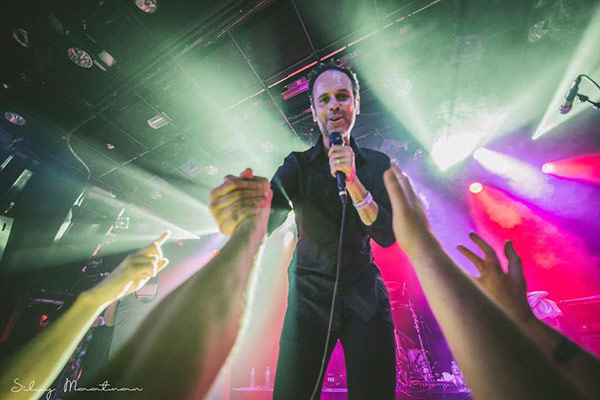
Scene Point Blank: I've read a few interviews were people have asked you what you currently listen to and you stated that you like listening to vinyl a lot and discovering music from the past. I thought that was interesting, getting back to the roots of music. The history of music was really just created from this giant collaboration of people. Do you think bands today have strayed away from that a bit or do you think music has progressed in this manner that is still collaborative?
Greg Attonito: I think that's a great way of putting it because every piece of music you hear is a collaboration in a sense because whoever recorded that music was influenced by something that got them to that point to make those choices, whether it's the way they're playing or the kind of lyrics they are trying to express. So yeah, that's exciting. I've never been the kind of person that is out finding the new stuff. Even when I was first getting into music I would kind of sit back. When I would go to shows a lot in my teenage years and in my twenties, I just went and saw what was playing at these venues I liked to go to. Sometimes you knew who it was and sometimes you didn't. Almost every time, even if the bands weren't that great, it was a good experience.
I don't do that anymore, though. I mostly spend 90 percent of my time creating and then someone's like "Hey, this sounds cool" or "Hey, I'm into this" and maybe I'll check it out, but I rarely do anymore. And like I said in that other interview, my wife and I, we love occasionally going to record stores and picking up whatever is cheap. Very odd, I barely have any punk or hardcore records at all though. I had a bunch way back but when I set off to tour forever, I condensed everything I own into nothing. So I sorta started from scratch a few years ago, which is fine, but it created a different thing where now I'm looking out for certain favorite punk and hardcore records that if I see them I'll pick them up. I'm very much a whatever comes my way kind of a person and like I said, it more inspires me to create and every once in a while I'm totally inspired. For example, Pete the guitar player, he just got married in New Orleans and he hired one of those street brass bands and had a police escort and you walk about a mile through the city. I gotta tell you, it was epic, it was amazing. You can probably watch some YouTube videos of the brass bands and they sound cool and it looks cool. As far as like a live music experience it was the coolest I've had in a long time. It was a combination of a lot of things, the band was ridiculous and so awesome and it included the tradition—like there was a serious tradition going on there, these guys come from a very localized style, and then you're in the city streets.
Scene Point Blank: They go around the city with you?
Greg Attonito: What happens is it starts in a certain place and everyone meets there with the band and it's kind of crazy and it's very affordable—you can have your own parade in New Orleans. You hire someone, they get you the permits and the police escort, and then you pay for the band. It's reasonable! You're getting a killer band and a police escort parade through the city for like just over a thousand dollars. It's amazing. You and your buds could chip in a hundred dollars a piece and you could have your own parade for a hundred dollars for you and all your friends. It's just awesome. That's also what's cool about the New Orleans culture, it's still part of the culture that is allowed. You couldn't do that in any other American city, the permits are probably ridiculous. Anyways, as far as a new musical experience for me, that recently was the most sort of moving different experience that I've had.
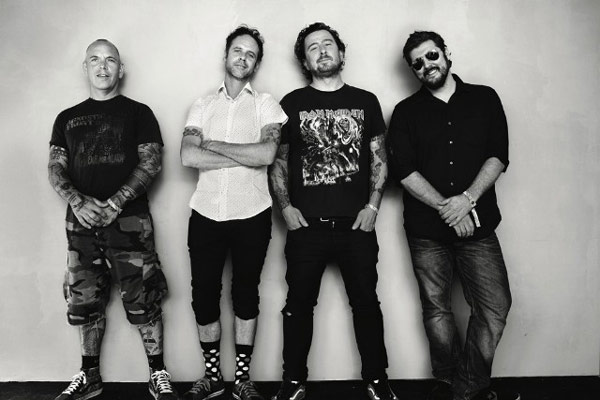
Scene Point Blank: I grew up listening to Johnny Cash and Buddy Holly, and because of them I fell in love with music and everything about it. What musicians from the past have influenced you like that?
Greg Attonito: Yeah, Johnny Cash is a big one. Through those teenage years there's a long list: Bruce Springsteen, The Ramones, The Replacements, and all those early years of getting into rock music. And then what was on the radio: Led Zeppelin, The Rolling Stones, The Beatles, they all had a big impact. Bob Marley and that whole realm of music too.
Scene Point Blank:Sometimes it feels like music was more exciting back then, but I guess the whole era was extremely different where music felt newer and now you just have so many options of what to listen to.
Greg Attonito: And I think it's a combination too that when we're teenagers the whole world is new too, so that window of time when you're like 14 to 25, you're discovering in a different way. Then when you hit your thirties you've experienced life a bit so you're not seeing the whole world as this fresh thing so you're in search of that feeling you once had. And I think that's the challenge of growing up; you want to continue to see the world in a positive way where you're discovering it. That's the challenge of not losing your sense of youth.
Scene Point Blank: That makes total sense. Speaking of youth, you started a children's band with your wife, and I guess what surprised me the most, but also made total sense, was that you two learned a lot about yourselves as musicians. It doesn't surprise me because kids are brutally honestly -- they either like it or they don't. Are you guys still preforming and making children's songs? And, also, do think it's challenged you as a musician overall in ways that apply to the Bouncing Souls or do you see the two as completely separate?
Greg Attonito: It's been great. First of all, Play Date is doing great and keeps growing. It has it's own legs now and we've established ourselves and we're getting offers now from that as opposed to the first year feeling of starting a band. That whole learning process was an eye opening experience for me because it helped me break some boundaries, you know, habits that you tend to get. Humans create habits with everything, our minds want to go and you want this thing to be comfortable because the world is a crazy, insane place so you need things to be put in places. In some ways, it's part of our survival mode, which is good. But in some ways, when it comes to creative things, you want to be able to break out because you tend to create the same things. Play Date helped me break away from those mental boxes, which when I came back into the Bouncing Souls environment I was a little more free. For me I see how it's affected the last couple of years, as well as George, our drummer, joining the Bouncing Souls. We had a few different elements and a fresh attitude with George. Play Date's grown and Bouncing Souls is evolving, which is great after all these years that we're still evolving. With George, now that he's been in the band for three years, we've gelled and now we're growing.
"Humans create habits with everything, our minds want to go and you want this thing to be comfortable because the world is a crazy, insane place so you need things to be put in places."
Scene Point Blank: The time span and difference between a record like How I Spent My Summer Vacation to Simplicty is a thing a lot of people bring up. And I get it, music is something that shouldn't be forced. So if the record wasn't supposed to come out then or wasn't right, then I get how a significant amount of time could span records. It also comes down to legacy as well, like I'm sure you'd rather wait to put out a good record than rush it and put out a half-assed one. So I guess what I'm getting at is, what kind of legacy do you want the Bouncing Souls to leave behind? What do you want to be remembered for?
Greg Attonito: I think that if you're a musician or an artist, you put your heart and soul into everything you do and then you kind of let the world decide what your legacy is. I could say these lofty things about what I want people to think about us, but our legacy is our moments that we're creating like last night in Detroit, and the night before in Chicago, and tonight in Pittsburgh; that'll be our legacy. It lives in people's minds and it lives when they play our records. Living in people's minds and hearts, that's the place to be.
